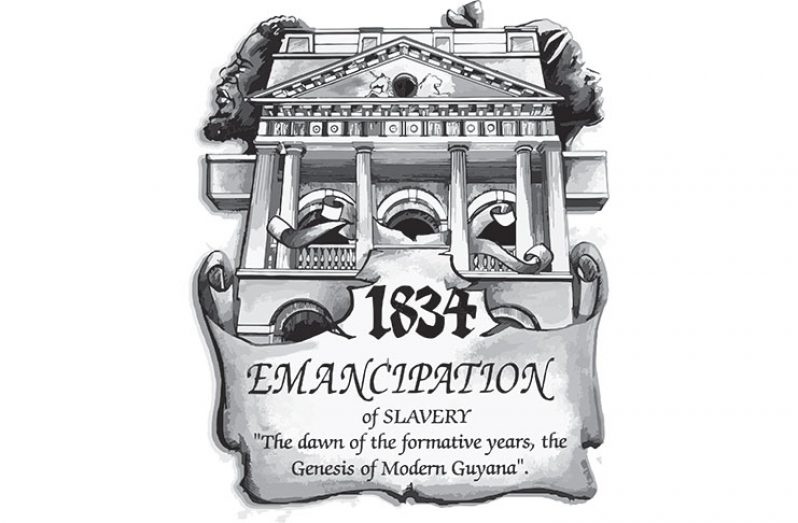By Barrington Braithwaite
I WAS asked by a senior media operative what I thought, from experience past and present and through my interaction with my younger offspring and their friends and my ‘grand’, about how this generation perceives ‘Emancipation’.
Truth to tell, the historical events of emancipation, in itself, and on a national scale has been a recent invocation into the active consciousness of Guyanese generally.
Two items have championed the resurgence of this awareness, the first of which was when the African Cultural Development Association (ACDA) petitioned the then Guyana Broadcasting Corporation (GBC) to release their ‘Folk Festival’ on August Monday and allow it to develop the annual Emancipation Festival.
The other is the iconic publication by then Ret. Brigadier David Granger of the Emancipation Magazine.
While ACDA familiarised the audiences with African fashions, foods and booths on books, craft and West African imagery, with international guest performances, local talent presentations and a general celebration atmosphere, the Emancipation Magazine and other publications of The Free Press documented the history and times of Emancipation, which was not just the historic purchase of the villages, but the tremendous challenges that were thrown at the freed African as they grappled with their right to exist and shape ideals to boast self esteem against doctrines aimed at stealing their very sense of humanity.
Young Guyanese will learn the very way all young people gather information: From edutainment documentaries. The inquisitive mind of young folk in a world of accelerated and myriad media expressions has to be competed for, through the alternative support of dramatic museum displays, theatre and movie dramas, school skits and comic books.
Neither ACDA nor The Free Press had the finances to expand into those areas with the consistency required to compete for the attention necessary to tell the emancipation story. The Free Press did publish illustrated booklets of 1763 and 1823, but these never were part of alternative reading in schools during the past administration, nor are they in the current.
As a matter of fact, the institutional interest in developing displays of this nature for any area of Guyanese social anthropology were only explored at the Walter Roth museum, by way of a children’s programme that was headed by Jennifer Wishart.
LIMITED PRECEDENTS
That is not to say that limited precedents did not exist. The model of the pork-knocker at the National Museum and his Amerindian counterpart have both excited and terrified young Guyanese over the past 50-odd years; but these museum displays were limited, and ad hoc in respect to their greater uses as edutainment tools, because of the absence of a comprehensive display which was impossible in the space of the museum and all that was supposed to fit therein. But as memories, they have excelled.
Where does emancipation rest in the minds of our youth will entail a study of the period between the year 1790 to 1918, which will capture a workable pageant of the Atlantic Slave Trade; plantation life under the Dutch and English; maroon communities and their interaction with plantations and the colony towns; the rise of Stabroek, then Georgetown; slavery in Berbice and the immediate social existence between 1838 to 1856; the Indentureship Period; and the rise of the first political movement of trade unionism.
Such a period cannot be narrated in lecture mode, outside of the teaching mechanisms that have made us aware of El Cid, Biblical epics, Space Travel or Forensic Science. Regardless of how biased and inaccurate some of those dramas were, they left interactive characters and a mental archive of imagery of that past age. An attractive drama has to be created that would entertain, intrigue and teach.
This concept is not alien to Guyanese over 50, who were teenagers and young adults when GBC’s James Sydney narrated Mittelhozer’s “My Bones and My Flute” and held our attention with a brilliant mystical story with historical insights.
EMANCIPATION AS A CONCEPT
Emancipation as an event and concept that deserves a profound effort, or the memory of Emancipation in the 12-year-olds of 2017 will be as follows:
‘De Emancipation BBQ’; ‘The Emancipation SOCA bash’; the fun-day at the park while wearing African Print clothes and so on.
The meaning will escape them, and least of their adult conversations on the subject in another decade will reflect a relevant memory of the struggles and lives of their ancestors, and how they coped with the social war that was declared against them, upon evacuating the plantations; the schemes to destroy their businesses, both rural and in the townships; and how the taxes they paid were utilised to aid the interests of the planters, resulting in the flooding of their cultivated lands.
Libations to the efforts of those past folk that endured the tests to survive will not be realised in the future; they will grow incognisant of what ACDA and ‘The Free Press’ have attempted through their efforts to inform them of.
We live in a dynamic age of communication technology. To reach our children; to sing ballads to their consciousness will require our digging deeper for the rhythmic iconography and artefacts that will hold their attention and kindle the fires to explore and realise that the sagas of past eras will repeat itself in different circumstances, if they are unaware of the same landmarks attired in familiar garb. Africans created the first Dynasties of Khemet [Pharaonic Egypt], and the epic of the Gods were dramatised in full costume some 4000 years ago.
The Greeks first, then all Mankind inherited the principle of their sacred Carnival, so it is erroneous that we cannot attempt to follow in their footsteps today as everyone has.



.jpg)








